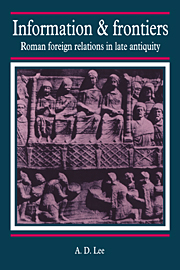Book contents
- Frontmatter
- Contents
- Preface
- Chronological list of selected Roman emperors (early third to early seventh century)
- Chronological list of Sasanian kings (220s–628)
- Map 1 The Middle East in late antiquity
- Map 2 Northern Mesopotamia and adjacent regions
- Map 3 The middle and lower Danube and adjacent regions
- Map 4 The Rhine and upper Danube and adjacent regions
- List of abbreviations
- Introduction
- PART I CONTEXTS
- PART II INFORMATION AND UNCERTAINTY
- 3 Background knowledge and assumptions
- 4 Strategic intelligence
- PART III SOURCES OF INFORMATION
- Select bibliography
- Index of sources
- General index
3 - Background knowledge and assumptions
Published online by Cambridge University Press: 29 September 2009
- Frontmatter
- Contents
- Preface
- Chronological list of selected Roman emperors (early third to early seventh century)
- Chronological list of Sasanian kings (220s–628)
- Map 1 The Middle East in late antiquity
- Map 2 Northern Mesopotamia and adjacent regions
- Map 3 The middle and lower Danube and adjacent regions
- Map 4 The Rhine and upper Danube and adjacent regions
- List of abbreviations
- Introduction
- PART I CONTEXTS
- PART II INFORMATION AND UNCERTAINTY
- 3 Background knowledge and assumptions
- 4 Strategic intelligence
- PART III SOURCES OF INFORMATION
- Select bibliography
- Index of sources
- General index
Summary
in his inaugural lecture at the London School of Economics in 1967, entitled ‘1914: the unspoken assumptions’, the distinguished historian of modern Europe, James Joll, drew attention to the need for those investigating the origins of the First World War to explore the underlying presuppositions which influenced decision-makers in the years and months leading up to August 1914 – ‘to reconstruct, so to speak, their ideological furniture’. Among other things, this would involve giving attention to the values and beliefs inculcated in the upper classes by the educational systems of the Great Powers, and to intellectual currents, such as Social Darwinism, exercising influence at a popular level. Clearly, a concern with ‘unspoken asumptions’ is a desideratum in the study of foreign relations in any period. As Joll readily acknowledged, however, it is no easy task to make connections between these sorts of areas and the conduct of foreign policy. If that is the case for the modern historian, with a mountain of letters, diaries and memoirs at his or her disposal, how much more difficult, if not impossible, for the historian of antiquity, for far more elementary matters such as what late Roman government knew of the geography and socio-political organisation of neighbouring peoples. Nevertheless, questions of this sort clearly need to be considered and some attempt made to answer them, even if rendered far from satisfactory by the nature of the available sources.
- Type
- Chapter
- Information
- Information and FrontiersRoman Foreign Relations in Late Antiquity, pp. 81 - 105Publisher: Cambridge University PressPrint publication year: 1993

